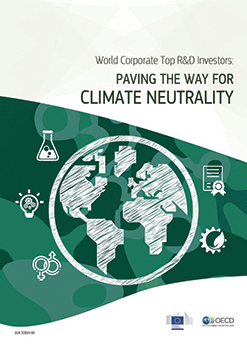Innovation
Intellectual property (IP) statistics and analysis
Intellectual property (IP) rights aim to stimulate innovation by enabling inventors to appropriate the returns on their investments. IP also plays an important role in the creation, dissemination and use of new knowledge for further innovation, as contained in the inventions disclosed in patent documents.
The changing landscape of innovation, the globalisation of markets and the fragmentation of production value chains, as well as the emergence of new players are changing the way market actors use IP rights and policy-makers understand rights and their role. The context in which IP currently operates is very different from the one in which IP rights were conceived. IP systems are undergoing continuous changes as they seek to optimise the balance between private and social benefits to contribute to economic growth and the welfare of societies.
Methodological work and publications | IP data | IP statistics task force
IP Bundle of world corporate top R&D investors
|
EC-JRC – OECD COR&DIP© database The Intellectual Property (IP) bundle of top corporate R&D investors (EC-JRC-OECD COR&DIP©) database is the result of a collaboration between the European Commission, Joint Research Centre Directorate B (Fair & Sustainable Economy) and the OECD STI Directorate. For the top 2000 corporate R&D performers worldwide, the COR&DIP© database links the Research & Development (R&D) activity with IP assets (patents and trademarks). It relies on EU Industrial R&D Investment Scoreboard data produced by the EC-JRC, covering the top 2000 corporate R&D investors worldwide, and on the IP database of the OECD STI Micro-data Lab infrastructure. To ensure transparency and foster further use, the latest version of the COR&DIP© database (v.4) and all previous versions, are publicly available.
|
|
|
World corporate top R&D investors: Paving the way for climate neutrality
|
 |
Methodological work and publications
A series of methodological documents have been published to help design and interpret IP-related statistics in an accurate manner.
- Identifying and measuring developments in artificial intelligence
- ICT: A new taxonomy based on the international patent classification
- Measuring patent quality: Indicators of technological and economic value
- World Corporate Top R&D Investors
- Innovation and IP Bundles (2015) | Download figures and tables
- Industrial Property Strategies in the Digital Economy (2017) | Download figures and tables
- Shaping the Future of Technologies and of Artificial Intelligence (2019) | Download figures and tables
- World Corporate Top R&D Investors: Paving the Way for Climate Neutrality (2021) | Download figures and tables
- Innovation and IP Bundles (2015) | Download figures and tables
- Cross-Country Characterisation of the Patenting Behaviour of Firms based on Matched Firm and Patent Data
- Universities’ Trademark Patterns and Possible Determinants
- Trademarks as an Indicator of Product and Marketing Innovation
- Scope and Definitions of Patent Families; Triadic Patent Families;
- Nowcasting Patent Data
- Patents in selected fields: biotechnology, nanotechnology, environment
- Patents by regions
- Analysing European and International Patent Citations: A set of EPO Patent Database Building Blocks
- Patents as Indicators of Science and Technology output
The OECD Patent Statistics Manual (2009) capitalises on new patent statistics and promotes the harmonisation of methodologies. It addresses issues regarding the complexity of patent data and provides statisticians and analysts with guidelines for building and analysing patent-related indicators. The manual is available in English, French and Spanish.
IP data
Patent-related indicators are available at OECD.Stat (Science, Technology and Patents). Selected indicators on patents, trademarks and design are presented in the OECD STI Scoreboard.
The OECD/STI Micro-data Lab contains records on IP rights documents from several administrative sources encompassing patents, trademarks and design rights. While patent data mainly rely on the Worldwide Statistical Patent Database (PATSTAT) maintained by the EPO, trademarks and design registrations are gathered from different IP offices (IP Australia, JPO, OHIM, USPTO).
Several patent-related dataset are made available to researchers upon request (from a secure password-protected server). The datasets can be used as a complement to other existing patent data sets (e.g. PATSTAT). Please fill in this short online form to get access to the data:
- OECD Patent Quality Indicators Database (series of indicators capturing the technological and economic value of EPO and USPTO patents)
- OECD Triadic Patent Families Database (set of patents jointly filed at EPO, JPO and USPTO)
- OECD REGPAT Database (EPO and PCT patents by regions)
- OECD Citations Database (references to patent and non-patent literature cited in EPO, USPTO or PCT patents)
- OECD HAN database (harmonised patent applicants’ names)
Conference on IP statistics for decision makers
 |
The 2022 IP Statistics for Decision Makers (IPSDM) conference took place on 14-15 June in Warsaw, Poland in a hybrid format. As in previous years, the focus was on how IP data, statistics and analysis can be used to inform decision-makers in both the public and private sectors, and to identify key data needs. Plenary sessions were dedicated to:
The conference was preceded by a few pre-event meetings (PATSTAT user day, IP data workshop) on 13 June. |
IP statistics task force
Project activities are conducted in close co-operation with the members of the IP Statistics Task Force, which gathers representatives from:
- Canadian intellectual Property Office (CIPO)
- European Patent Office (EPO)
- European Union Intellectual Property Office (EUIPO)
- Eurostat
- Hellenic Industrial Property Organisation (OBI)
- Israel Patent Office (ILPO)
- Instituto Mexicano de la Propriedad Industrial (IMPI)
- Instituto Nacional de Propriedad Industrial (INAPI)
- Institut National de la Propriété Industrielle (INPI)
- IP Australia
- Intellectual Property Office - United Kingdom (UKIPO)
- Intellectual Property Office of New Zealand (IPONZ)
- Japanese Patent Office (JPO)
- Korean Intellectual Property Office (KIPO)
- National Science Foundation (NSF)
- Organisation for Economic Co-operation and development (OECD)
- Ufficio Italiano Brevetti e Marchi (UIBM)
- US Patent and Trademark Office (USPTO)
- World Intellectual Property Organization (WIPO)
Related Documents